
Baby, it’s cold inside.
When looking for the best space heaters, your biggest concern is probably how quickly they can thaw out your toes. These handy devices are perfect for heating up small spaces, especially when central heating is unavailable. Many space heaters have varying degrees of ease of use and effect on the electric bill. However, they come with some pretty big caveats that come with purchasing an electric space heater, not the least of which is safety.
In this edition of The Senior’s Guide, we’ll share tips on what to look for when shopping for electric space heaters, and tips on how to keep your home toast, not torched.
Why a space heater?
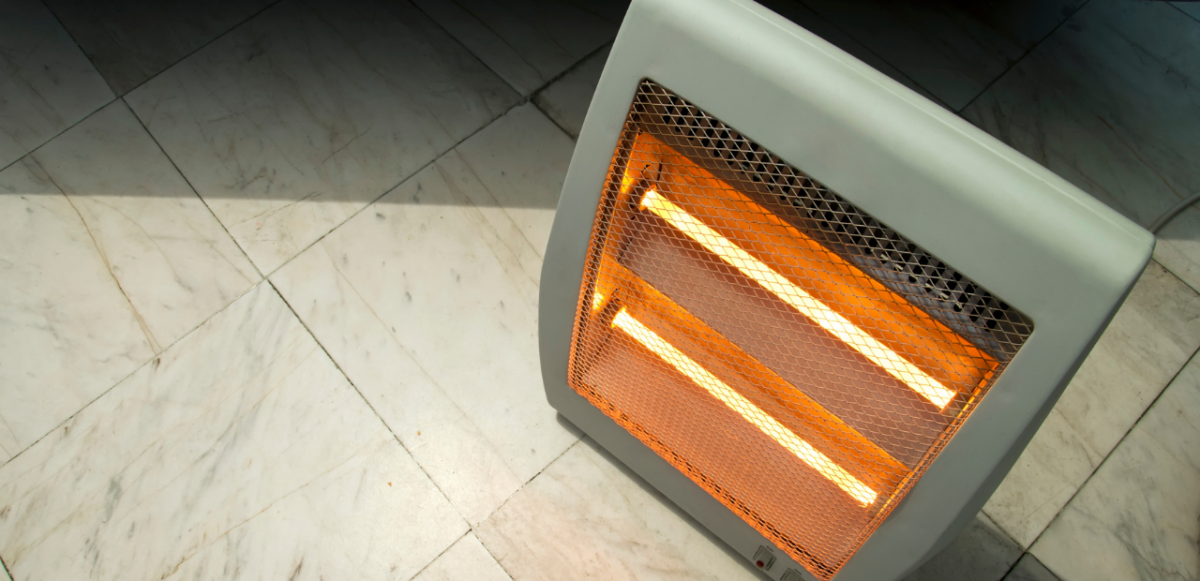
Space heaters are a good way of warming up a smaller space like a bedroom and are often available at relatively low prices. For people without central heating, or who want to save some money by only heating a few rooms, a space heater can be an economical, energy-efficient option. However, there are some things to ask before you pull out your credit card.
- What room do you want to heat? – Space heaters work best when warming smaller spaces, like bedrooms, or specific areas of spaces, like a seating area. If you need to warm an entire house, you’d need a space heater for each room. Keep in mind, however, that you don’t want to blow the budget on electric bills. At that point, it would be cheaper to turn on the central heating. Space heaters are also a poor choice for bathrooms and kitchens, as exposure to liquids can raise the risk of a short circuit. In addition, indoor space heaters are a bad pick for outdoor applications: consider an outdoor heater or patio heater instead.
- When do you want to heat the room? – Space heaters work best when being monitored. Leaving one unattended is a fire hazard, including letting one run overnight. An adjustable thermostat and a safety feature like a safety shutoff can mitigate this risk somewhat, but if you’re looking to warm a sleeping space overnight, you may want to consider alternative heating methods.
- Who else is living with you? – If you have a pet, or are frequently host to grandchildren, it’s important to choose an electric space heater without an exposed heating element. Exposed elements can lead to burns and increase the risk of a fire if the electric space heater is knocked over. It’s also important to purchase an electric space heater that automatically shuts off when tipped over, even if you don’t have a pet. Accidents happen, and this very basic safety feature can save your life.
What sort of heater should I choose? What are my options for the best space heaters?
In terms of the best room heater, there are a couple of options to consider, each with its own set of pros and cons. Space heaters rely on one of two forms of heat transfer: convection or radiation.
Convection space heaters use a heating element like a ceramic plate, metal coil, or oil-filled tube. This raises the ambient air temperature, making the room feel warmer. Convection heaters are suitable for heating entire spaces, though it takes them a bit longer to heat specific options. They also struggle in larger spaces, requiring proportionately more energy to work.
Radiation heaters don’t heat the air. Instead, they use infrared light to heat people and objects directly. Whenever you feel the toasty warmth of the sun on your skin, you’re experiencing radiant heat. Radiation heaters tend to be quiet, since they don’t require the movement of air to work. However, they’re usually more expensive, especially when it comes to electric bills.
From there, you’ve got a variety of solid options:

Ceramic Heaters are one of the most common and inexpensive options. These heaters work by warming a ceramic heating element, which warms a set of aluminum fins. A fan blows air across the fins, warming your room or workspace with convection.
The nice thing about ceramic heaters is that they work instantly, and maintain their heat setting even after being turned off. Ceramic heaters with thermostats are good at maintaining a stable temperature for minimal power input. Simply set your desired temperature and wait. However, they’re not very good at warming larger spaces.
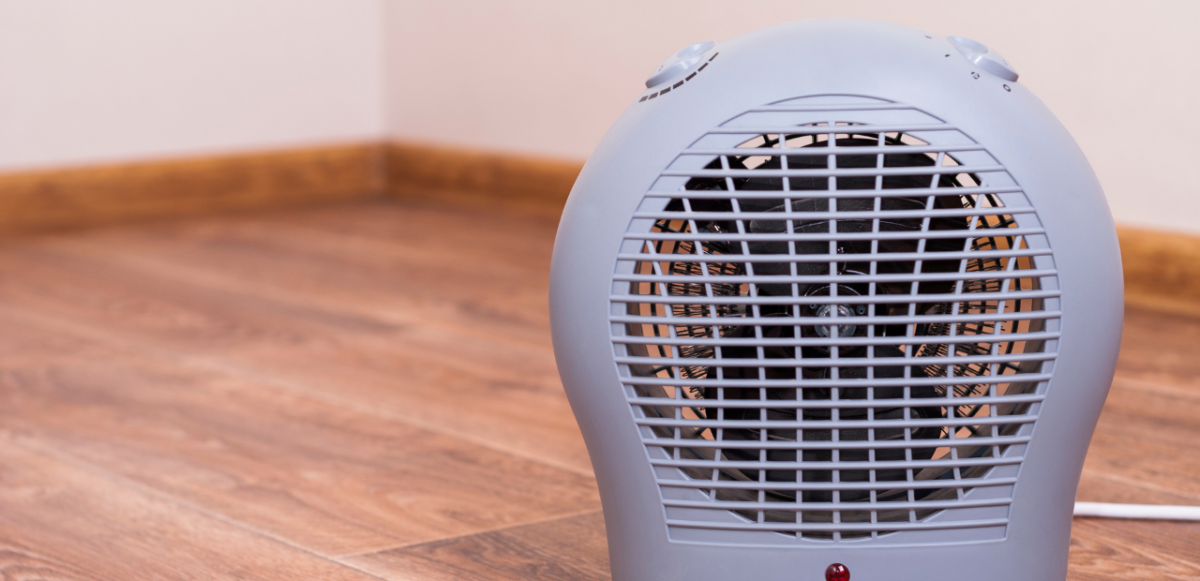
Fan Heaters are almost identical to ceramic heaters, but forgo the ceramic heating element for a simple metal coil. Since there are no ceramics, the heater can’t retain heat after being turned off. As such, this type of heater isn’t always the most energy efficient heater option, though their low price point can be appealing.
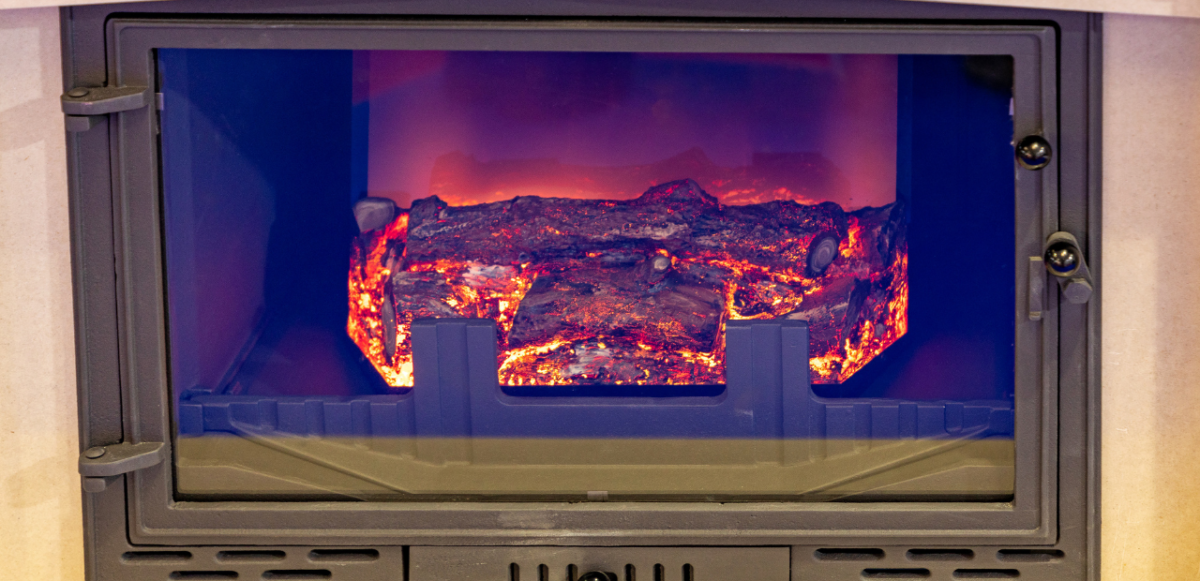
Infrared Heaters are radiation-style heaters that work by heating up objects (including people), rather than the air. Many electric fireplaces are actually infrared heaters with a special LED insert to create the flame effect. These make for an energy-efficient and aesthetically attractive heater. You can even disable the heat setting to have the cozy effect in the summer months, making them some of the best electric heaters.
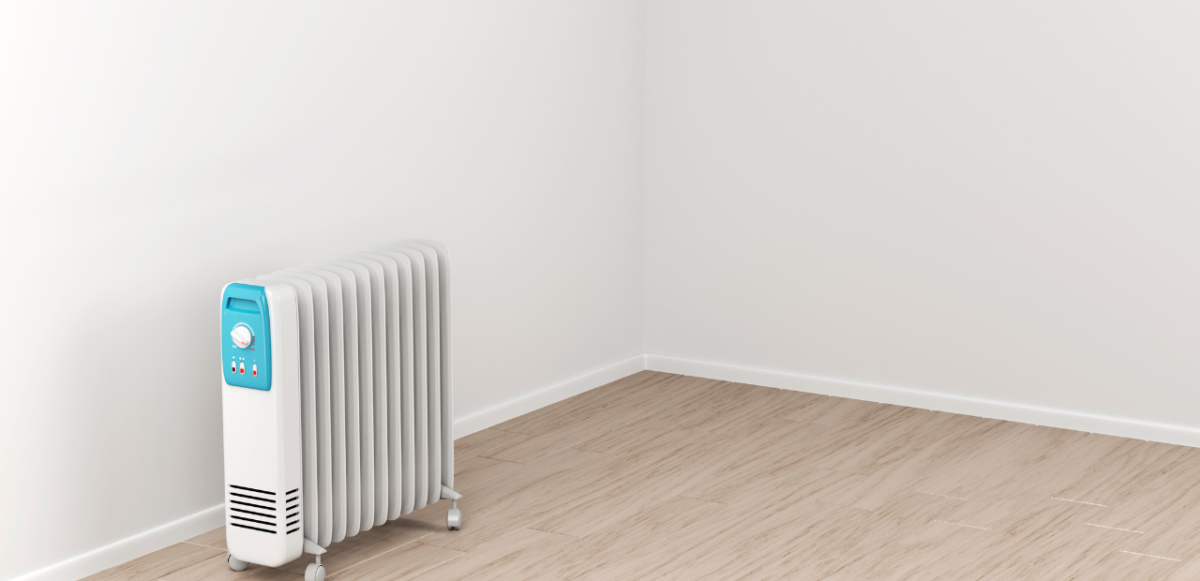
Oil-Filled Space Heaters resemble old-fashioned radiators (though despite the name, all radiators are actually convection heaters). They work by using an internal heating element to heat oil, which then flows through various columns or fins. Unlike ceramic heaters, these types of heaters almost never include a fan. Instead, they rely on natural convection to warm the air. This energy efficient space heater is great for warming sleeping areas, as they retain heat for a long time. You can run them for a few hours before bed, then shut them off before going to sleep to minimize the fire risk. However, they’re often expensive, heavy, and a poor choice for warming larger rooms.
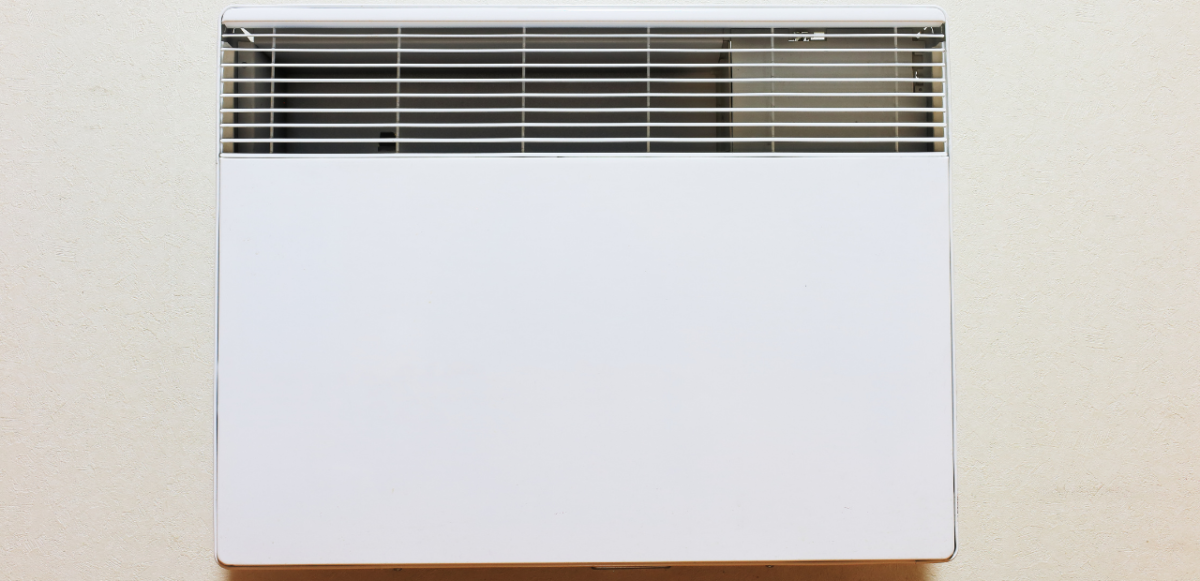
Panel Heaters are meant to be mounted on walls, and are among the safest heaters to run. Many are designed to be run continuously, and since they’re mounted in the walls they can’t be tipped over like a typical space heater. Unfortunately, this type of space heater is not very powerful compared to other heaters, and often won’t be enough to warm a space on their own. Installation can also be expensive.
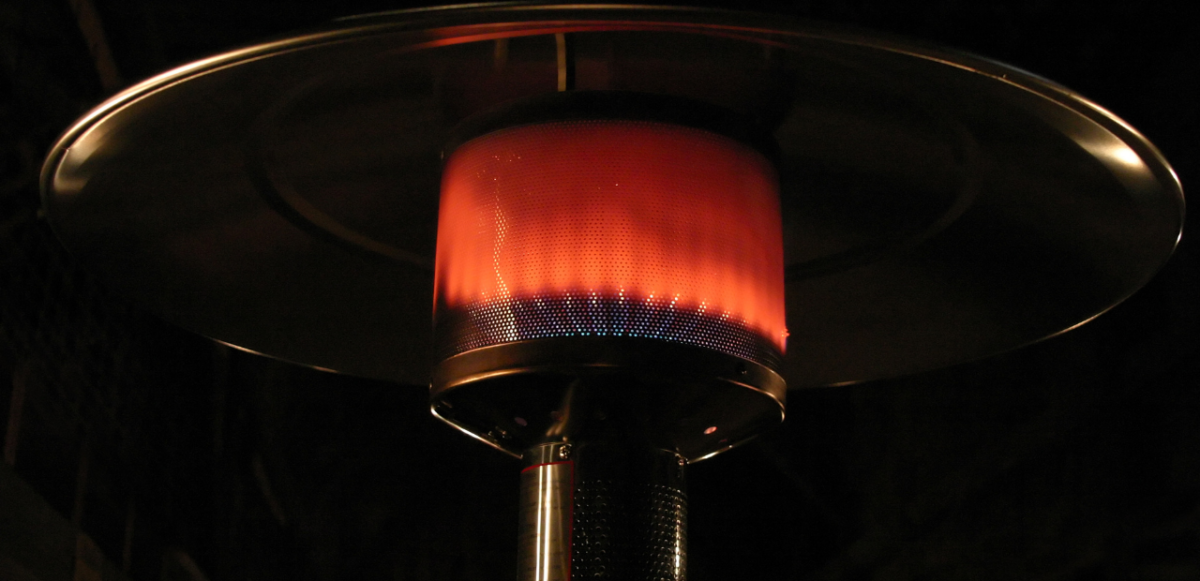
Propane Heaters are among some of the best patio heaters. They’re radiation-style outdoor heater options that work using liquid propane as fuel, meaning they don’t require electricity at all. However, most propane heaters are meant for outdoor space use only, as the risk of carbon monoxide poisoning is exceptionally high in enclosed spaces.
Ultimately, picking the right space heater depends on your living situation, use case, and budget. If you need to warm a larger space like a basement or an apartment, an infrared heater is a solid choice. If you just want a source of heat for a small area, like a reading nook, a ceramic heater or fan heater is a good choice. Oil-filled heaters are suitable for heating spaces for longer periods, while propane heaters are some of the best patio heaters for the outdoor space. If you can afford them, panel heaters are a solid choice for taking the chill out of a space that already has central heating.
Space Heater Safety Tips

No matter what kind of heater you buy, there are some important safety tips to keep in mind:
Buy a heater with tip-over protection: This can take the form of a button on the bottom or an internal gyroscope. Knocked-over space heaters are a fire hazard, so auto shut-off is essential.
Do not place the heater on shelves, tables, or other furniture: Place the heater on the floor: preferably on a hard surface. If your home is carpeted, you can purchase an inexpensive floor tile, paving stone, or terracotta plate to put the heater on.
Keep the heater away from flammable objects like paper or fabric: This is especially true if you have a Christmas tree up during the holidays, as they are among the most flammable objects you can bring into your home.
Keep the heater away from plastic objects and electronics: A heater under your computer desk can be cozy, but too much heat can melt your hardware. Heated TV stands are also a risk: Ensure all electronic devices are out of line-of-sight of the heating element, including any speakers or cords.
Only plug your space heater into wall outlets, not power strips: Power strips and extension cords lack the fire protection a wall outlet has. Even the most energy-efficient heater draws a lot of electricity and can easily overload a power strip. This is especially true if the power strip has a lot of other things plugged into it. Smart plugs that go directly into the outlet, including timer plugs, are fine. Just avoid things with extension cords.
Never run your space heater unattended: Turn it off if you leave the room or go to sleep, and consider using a timer or smart plug to shut it off after a pre-defined period of time automatically.
Practice proper cord safety: Throw out devices with damaged cords, and make sure not to run power cords under rugs or other fabric.
Monitor humidity in your space: Space heaters dry out the air, potentially leading to dehydration. Consider running a humidifier in the same room as your space heater, but ensure they’re not too close together. If you run a propane heater, you may have to worry about the air becoming too humid instead. Inexpensive humidity meters can help save a lot of headaches.
Never run a propane heater indoors unless it is indicated for indoor use: Never use a propane heater in a poorly ventilated space. Make sure a window is open nearby, and that a carbon monoxide detector is installed. If you can’t do either of those things, rely on an electric heater instead.
Keep all of this in mind, and you can stay warm and cozy all winter long!
Of course, if you’re tired of the cold, relocating to an assisted living facility in a warmer locale is always an option. Our free comparison tool reviews nursing homes and assisted living communities nationwide, including reviews, ratings, and violation records. Enter your zip code to begin your search today!





